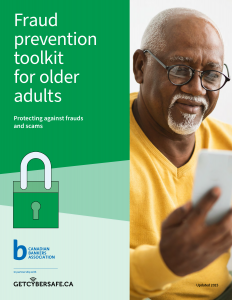Among the many threats facing some of the most vulnerable members of our communities – seniors and elders – fraud is the number one crime against older Canadians.
So when it comes to practising safe tech, when it comes to talking about good cyber hygiene, there’s no better time than now: across Canada, many cities and provinces have declared June as Seniors Month, and this week marked Elder Abuse Awareness Day around the world.
Such proclamations from governments, community organizations, and various seniors’ agencies honour and respect older adults, both for the many contributions they have made to society during their long lives, but also as a sign of how we all want to be treated, no matter our age: with kindness, respect, empathy, and connection.
But every year, people of all ages fall victim to fraud and abuse, of course, not only seniors.
According to the Canadian Anti-Fraud Centre (CAFC), 63,847 Canadians reported being targeted by scammers in 2023 and they lost over $578 million to fraud and online crime. Worldwide, people age 60 and over lost a combined $3.4 billion to fraud in 2023 alone, part of the estimated $48 billion price tag for e-commerce fraud of various types.
As hefty as those financial losses are, many victims of fraud also report serious emotional and psychological harm, with impacts on their life well beyond the bottom line.

Robert Falzon, Head of Engineering, Office of the CTO – Security Evangelist at Check Point, in a screen grab from recent CBC interview.
“It’s definitely an important topic,” says Robert Falzon of the online scams putting older Canadians at risk. “Cyber criminals are exploiting not just technology, but people’s trust, isolation, and unfamiliarity with digital warning signs.”
He says education and communication about cyber safety for seniors is crucial. Based in Calgary, Falzon is Head of Engineering, Office of the CTO – Security Evangelist at Check Point Software Technologies, Ltd., a leading international IT security firm.
Starting with the COVID experience, he points out, many of us – and many seniors – were forced onto iPads, smartphones, and other digital media technologies just to stay connected, much less to work, shop, or obtain other services.
Add to that, on-going developments in online shopping and the ‘cashless society’, as well as the use of digital devices for personal identification and validation. They’re all increasing to the point where “many seniors are being pushed to now get online the services they normally got in person” Falzon describes, with the push often coming from businesses and governments that are looking to save money or boost efficiency by using more automation and technology.
With more and more seniors using digital tools to stay in touch with loved ones, to do their shopping and banking, and to interact with healthcare providers, they’ve also become prime targets for increasingly frequent and complex online scams, Falzon says.
“There’s a rapid escalation of these types of attacks and the types of technology being used; it’s hard enough for anybody to identify the latest challenges, and as we get older that’s even harder. We’re not prepared for the risks we’re exposed to.”
It’s important to know what kinds of fraud one might encounter, and to be aware of some new threats to older adults.
The top three most reported types of fraud in Canada, according to the Canadian Anti-Fraud Centre, were identity fraud, service fraud, and phishing – all are designed to get someone to pay or give away sensitive information like a social insurance number, log-in password, or banking details.
Seniors are often targeted as emotionally susceptible, not technically inept.

Romance scams, fraud targetting grandparents, fake phishing and spearing attacks against seniors are on the rise.
One scam for targeting seniors that’s growing in usage is known as ‘the romance scam.’ Through phone calls, emails or text, a scammer pretending to be a suitor tries to get a targeted senior to give them money. Another favourite is ‘the grandparent scam’, in which a scammer assumes the identify of a grandchild (or other family member) and pressures an elder to give or send money to a supplied email address because, they say, they are in some kind of trouble. ‘Service fraud’ involves a scammer who pretends to be rep of a well-known company or government agency. They try and trick people into revealing personal information, turning over credit cards, even banking data, preying on the trust of the targeted person and reputation of the company.
(In such cases, although the reputational or emotional pull may be great, people are advised to just say ‘No’. To hang up, and to then check the whereabouts of your relative or the status of your service provider. Some families have even instituted their own kind of secret password, one only a family member would know, to protect themselves from such deceptions).
Falzon notes, however, that these types of scams are emotionally manipulative by design and they are getting much more convincing with the use of artificial intelligence, or AI.
“You could tell a phishing email pretty easily in the old days,” Falzon chuckles. “The message would have Amazon spelled wrong or have the wrong logo and branding. You could pretty much tell right away it was a scam.
“Now criminals are using AI and ML (machine learning) to supercharge their attacks. Scammers are far better at spelling and grammar, but that’s not all. Imagine receiving a phone call in which a loved one’s voice has been cloned using AI!”
Just being aware what’s possible is very important to preventing online fraud.
“The first thing is education, no question about it,” Falzon says of way to increase online safety and cyber hygiene. Computers and mobile phones both need protection. Software should be up to date. Passwords should be changed regularly. Suspicious emails and unknown links should not be opened or clicked. Family members should sit down with relatives and talk about these issues, talk about the risks, and talk about the fact that it is not someone’s fault if they are victimized.

Educational and awareness are crucial to preventing online fraud.
“Some seniors may be less willing to make it known they’ve been victimized,” Falzon empathizes. “They may not tell even a family member if they’ve been scammed. They don’t want to be embarrassed, sure, but if you are vulnerable, if you are a victim, that may cause people to question your abilities otherwise. Your cognitive abilities may be questioned because of an online attack. Seniors may feel a loss of autonomy or individual freedom will be the result of a hack. But it’s not on them; they should not be embarrassed; they should not kick themselves. It happens to everybody, and it’s OK to get help.”
Falzon mentioned the website resources available at the CAFC, the Canadian Anti-Fraud Centre, as a good place to start. It has a list of the current scams being perpetrated out there, and descriptions of fraud types targeting individuals and businesses. There’s tips to protect yourself, advice on what to do if the protection fails and you become a victim, and there’s a way to report a scam or fraud.

Online resources provide specific anti-fraud information, tips and advice for seniors.
There’s also a Fraud Prevention Toolkit for Older Adults, created by the Canadian Bankers Association, in collaboration with the Government of Canada’s Get Cyber Safe campaign.
It includes a fraud prevention checklist, tips to avoid phone fraud, as well as recommendations on how to choose strong passwords and offers information on how to recognize and prevent financial abuse.
Elder Abuse Prevention Ontario, a provincial organization providing education, training, resource development and information about the increasingly complex issues of elder abuse, has a selection of facts sheets about elder abuse and fraud, and the Office of Seniors Advocate (British Columbia) is another provincial agency providing fraud prevention tips and advice, as well.
Check Point has tips and advice on its website, too, Falzon says, adding that the company, while known for sophisticated IT and cyber services to large international firms, also has a consumer facing tool for cyber security.
Having acquired a company called ZoneLabs in 2004, Check Point offers anti-virus tools, ransomware and phishing protection, as well as safe browsing experiences for desktop computers and mobile devices of all kinds under the Zone Alarm brand.
# # #
Anyone who suspects they have been the victim of cybercrime or fraud should report it to their local police and to the Canadian Anti-Fraud Centre’s online reporting system or by phone at 1-888-495-8501.
People who are aware of scams, but not victims themselves, are also encouraged to report suspicious activity to the CAFC.
-30-



